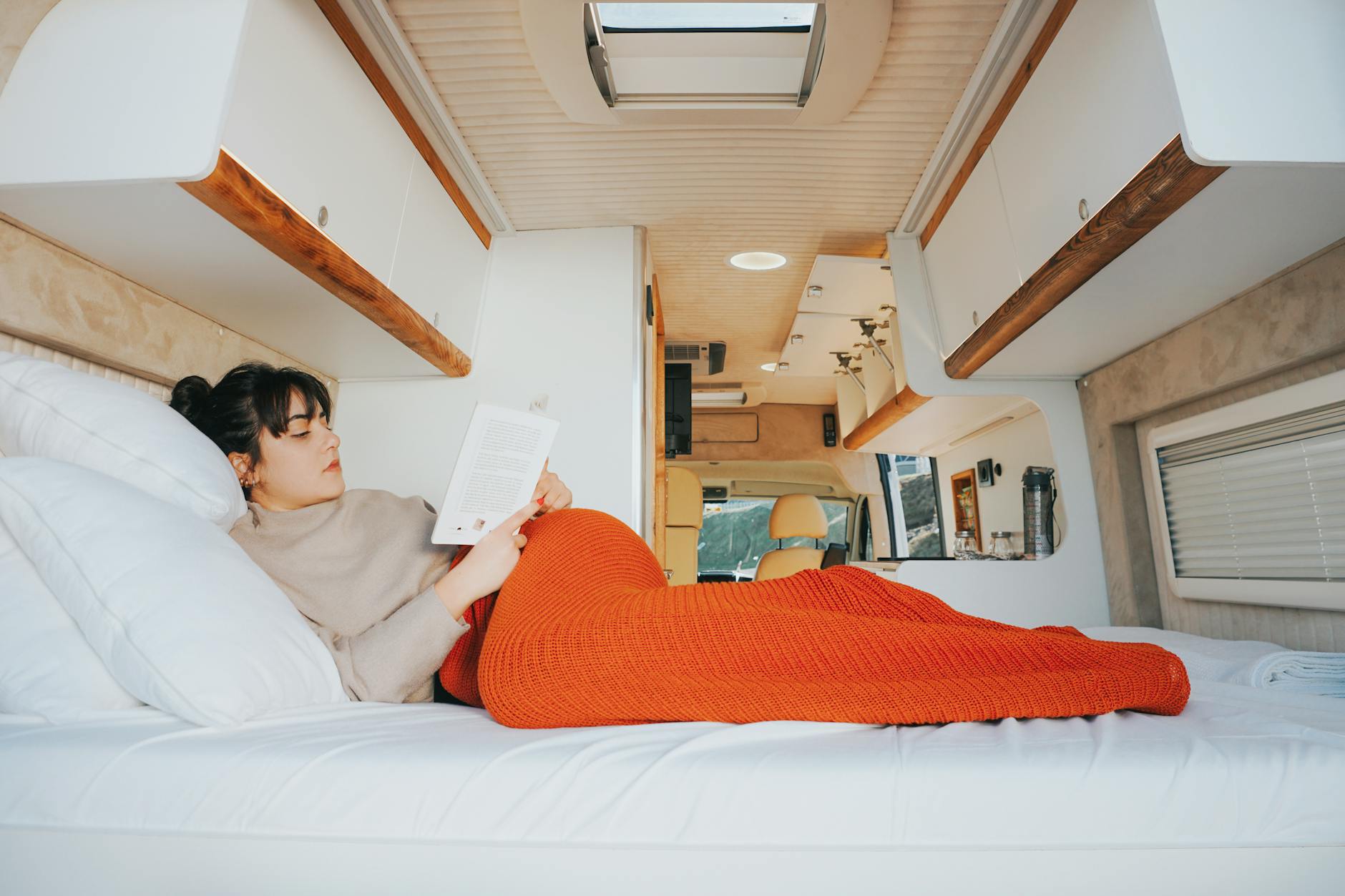
Have you ever felt weighed down by the sheer amount of stuff in your life? Imagine a life where you can pack up everything you own in a single backpack and set off on an adventure at a moment’s notice. This is the essence of nomadic minimalism – a lifestyle that combines the freedom of constant travel with the simplicity of owning less.
In a world that often equates success with material possessions, nomadic minimalism offers a refreshing alternative. It’s about prioritizing experiences over things and finding fulfillment in the journey rather than the destination. But how does one embrace this lifestyle? What are the challenges, and more importantly, what are the rewards?
In this blog post, we’ll explore the fascinating world of nomadic minimalism. From understanding the core principles to practical tips for implementation, we’ll guide you through every aspect of this liberating lifestyle. Whether you’re a seasoned traveler or just someone curious about living with less, join us as we unpack the art of nomadic minimalism and its potential to transform your life.

Embracing the Nomadic Lifestyle
The nomadic lifestyle offers a unique blend of freedom, adventure, and personal growth. By shedding the constraints of a fixed location, nomads open themselves to a world of possibilities.
Freedom from material possessions
One of the core tenets of nomadic living is the liberation from excessive material belongings. This minimalist approach allows for:
- Greater mobility and flexibility
- Reduced stress associated with maintaining possessions
- Focus on experiences rather than things
- Financial savings from decreased consumption
Exploring new cultures and experiences
Nomads have the privilege of immersing themselves in diverse cultures and environments. This constant exposure to new experiences leads to:
| Benefits | Examples |
|---|---|
| Personal growth | Developing adaptability and open-mindedness |
| Cultural intelligence | Understanding different customs and traditions |
| Expanded worldview | Gaining new perspectives on global issues |
| Lifelong learning | Acquiring new skills and knowledge |
Adapting to constant change
The nomadic lifestyle requires a high degree of adaptability. Embracing change becomes second nature, leading to:
- Enhanced problem-solving skills
- Increased resilience in the face of challenges
- Improved decision-making abilities
- Greater comfort with uncertainty
Building a global network
As nomads traverse the globe, they have the opportunity to form connections with people from all walks of life. This global network offers:
- Diverse friendships and relationships
- Professional opportunities across borders
- A support system spanning multiple countries
- Rich cultural exchanges and shared experiences
By embracing the nomadic lifestyle, individuals open themselves to a world of possibilities, personal growth, and unique experiences that can profoundly shape their lives and perspectives.

Essential Principles of Minimalism
As we delve into the core of nomadic minimalism, it’s crucial to understand the fundamental principles that guide this lifestyle. These principles not only simplify your life but also enhance your ability to embrace a nomadic existence.
A. Quality over quantity
In the world of minimalism, the focus shifts from accumulating possessions to cherishing fewer, high-quality items. This principle is especially vital for nomads who need to carry their belongings with them. Here’s a comparison of the quality-over-quantity approach:
| Traditional Approach | Minimalist Approach |
|---|---|
| Multiple cheap items | Few high-quality items |
| Short lifespan | Durability and longevity |
| Frequent replacements | Less frequent purchases |
| Higher long-term cost | Cost-effective in the long run |
B. Purposeful consumption
Nomadic minimalists practice intentional purchasing, considering the utility and necessity of each item. This mindset helps in:
- Reducing impulse buys
- Saving money for experiences
- Minimizing waste
- Streamlining possessions for easier travel
C. Decluttering techniques
Effective decluttering is essential for maintaining a minimalist lifestyle on the move. Some popular techniques include:
- The KonMari Method: Keep only items that spark joy
- The 90/90 Rule: If you haven’t used it in 90 days and won’t in the next 90, let it go
- One-in-one-out: For every new item acquired, remove one
- Digital decluttering: Regularly clean up digital files and apps
D. Digital minimalism
In our increasingly digital world, managing virtual clutter is as important as physical decluttering. Digital minimalism involves:
- Streamlining email subscriptions
- Organizing digital files and photos
- Limiting social media usage
- Choosing versatile digital tools over multiple specialized apps
E. Mindfulness and intentional living
At the heart of nomadic minimalism lies the practice of mindfulness and intentional living. This principle encourages:
- Being present in the moment
- Making conscious choices about possessions and experiences
- Prioritizing personal growth over material accumulation
- Cultivating gratitude for experiences and relationships
By embracing these essential principles of minimalism, nomads can create a lifestyle that’s not only lighter in terms of possessions but also richer in experiences and personal fulfillment. Next, we’ll explore practical tips to help you implement these principles in your nomadic journey.

Practical Tips for Nomadic Minimalists
Now that we understand the principles of minimalism, let’s explore practical tips to make your nomadic lifestyle more streamlined and efficient.
A. Capsule wardrobe essentials
A capsule wardrobe is crucial for nomadic minimalists. Focus on versatile, high-quality pieces that can be mixed and matched easily:
- 3-4 tops
- 2-3 bottoms
- 1 versatile dress or suit
- 1 light jacket or sweater
- Comfortable, multi-purpose shoes
B. Multifunctional gear and gadgets
Invest in items that serve multiple purposes to maximize utility while minimizing bulk:
| Item | Multiple Uses |
|---|---|
| Swiss Army Knife | Cutting tool, bottle opener, screwdriver |
| Sarong | Beach towel, blanket, privacy curtain |
| Smartphone | Camera, e-reader, navigation device |
| Packing cubes | Organizers, laundry bags, pillows |
C. Sustainable travel practices
Embrace eco-friendly habits to reduce your environmental impact:
- Use a reusable water bottle and shopping bag
- Opt for digital tickets and documents
- Choose eco-friendly accommodations
- Support local businesses and sustainable tourism initiatives
D. Streamlining digital files and tools
Organize your digital life to maintain efficiency on the road:
- Use cloud storage for important documents
- Utilize productivity apps for task management
- Implement a consistent file naming system
- Regularly declutter digital spaces, just as you would physical ones
By implementing these practical tips, you’ll be well-equipped to embrace the nomadic minimalist lifestyle. Next, we’ll explore how to overcome common challenges that arise when living this way.

Overcoming Challenges of Nomadic Minimalism
Now that we’ve explored practical tips for nomadic minimalists, let’s address some common challenges you may face and how to overcome them.
A. Maintaining relationships
Maintaining relationships while constantly on the move can be challenging, but technology has made it easier than ever. Here are some strategies to stay connected:
- Schedule regular video calls with friends and family
- Use social media to share your experiences and stay updated on loved ones’ lives
- Join online communities of like-minded nomads for support and friendship
B. Finding temporary accommodations
Securing comfortable and affordable temporary accommodations is crucial for nomadic minimalists. Consider these options:
- House-sitting
- Airbnb or other short-term rental platforms
- Hostels or co-living spaces
- Couchsurfing
| Accommodation Type | Pros | Cons |
|---|---|---|
| House-sitting | Free, homely | Limited availability |
| Short-term rentals | Privacy, amenities | Can be expensive |
| Hostels | Affordable, social | Less privacy |
| Couchsurfing | Free, cultural exchange | Uncertain comfort |
C. Managing finances on the move
Financial management is crucial for sustaining a nomadic lifestyle. Here are some tips:
- Use budgeting apps to track expenses across different currencies
- Set up a digital banking system for easy access to funds
- Consider freelance or remote work opportunities for steady income
- Diversify your income streams to ensure financial stability
D. Staying productive while traveling
Maintaining productivity can be challenging when your environment is constantly changing. Try these strategies:
- Establish a portable work setup (laptop, noise-canceling headphones, etc.)
- Create a consistent daily routine, regardless of location
- Utilize productivity apps and tools to stay organized
- Find co-working spaces or cafes with reliable Wi-Fi in each destination
By addressing these challenges head-on, you can fully embrace the nomadic minimalist lifestyle. Next, we’ll explore the profound impact this way of living can have on your personal growth and the world around you.

The Impact of Nomadic Minimalism
As we explore the final aspect of our journey into nomadic minimalism, let’s delve into the profound effects this lifestyle can have on individuals and the world around them.
A. Reduced environmental footprint
Nomadic minimalism significantly contributes to a smaller ecological impact. By owning fewer possessions and living more efficiently, nomadic minimalists:
- Consume less energy
- Generate less waste
- Reduce their carbon emissions
This lifestyle choice aligns perfectly with sustainable living practices, as shown in the table below:
| Aspect | Traditional Lifestyle | Nomadic Minimalist Lifestyle |
|---|---|---|
| Energy consumption | Higher due to larger living spaces | Lower due to compact living arrangements |
| Waste generation | More waste from excess possessions | Less waste from minimal belongings |
| Carbon footprint | Larger from frequent consumption | Smaller from conscious choices |
B. Improved mental clarity and focus
Embracing nomadic minimalism often leads to enhanced mental well-being. With fewer material distractions, individuals experience:
- Reduced stress levels
- Increased ability to concentrate
- Greater mindfulness in daily life
C. Enhanced problem-solving skills
Living with less and adapting to new environments regularly hones one’s ability to think creatively and find innovative solutions. Nomadic minimalists often develop:
- Adaptability in various situations
- Resourcefulness with limited means
- Quick thinking in unfamiliar circumstances
D. Greater appreciation for experiences over possessions
Perhaps one of the most transformative impacts of nomadic minimalism is the shift in values from material wealth to experiential richness. This change manifests in:
- Prioritizing travel and new experiences
- Forming deeper connections with people and cultures
- Finding fulfillment in memories rather than objects
By embracing nomadic minimalism, individuals not only simplify their lives but also contribute to a more sustainable world while gaining valuable personal growth and life experiences.

Nomadic minimalism offers a unique way to experience life, combining the freedom of travel with the simplicity of owning less. By embracing this lifestyle, individuals can break free from material attachments and focus on experiences, personal growth, and meaningful connections. The principles of minimalism, when applied to a nomadic lifestyle, allow for greater flexibility, reduced stress, and increased mindfulness in daily living.
As you embark on your journey towards nomadic minimalism, remember that it’s a process of continuous learning and adaptation. Start small, be patient with yourself, and focus on the benefits this lifestyle can bring. Whether you’re looking to travel the world or simply declutter your life, the concepts of nomadic minimalism can help you create a more intentional and fulfilling existence. Take the first step today and discover the freedom that comes with living with less and exploring more.





